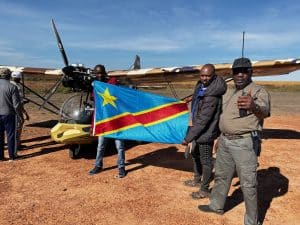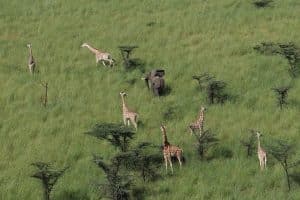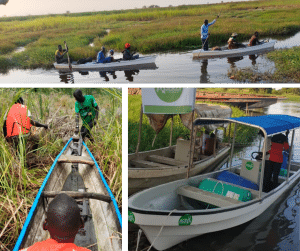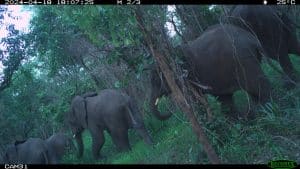We support the protection of elephant landscapes across Africa, from those with relatively large but threatened elephant populations, to areas with a few scattered survivors whose numbers may grow if safeguarded.
One of Africa’s most threatened and important elephant populations is in the border region between Benin, Burkina Faso and Niger. The majority of West Africa’s elephants live here. While jihadists have overrun the parks in Burkina Faso and Niger and the security situation is dire, African Parks, working with the government, is defending those in Benin, but at a high financial and human cost. This year, ECF support in this area has included vital helicopter operational costs, 11 satellite tracking collars for elephants, field equipment for rangers, and the purchase of a Savannah ultralight aircraft to conduct aerial patrols. A radio network upgrade increased communication coverage to 95% of the area, although this has reduced slightly after an insurgent attack on a radio repeater.
Upemba National Park in southern Democratic Republic of Congo is home to the last hundred or so survivors of the region’s once vast population of savannah elephants. Upemba, one of the most lawless parts of Africa, is under intense pressure from Mai-Mai rebels and illegal miners, making protection difficult. The ECF has helped Forgotten Parks Foundation, which holds management authority for the park, with the purchase of an ultralight aircraft and running costs, including a pilot’s salary. It has proved transformative, allowing park management to know where the elephants actually are and deploy rangers to the right place to protect them.
Elephant conservation in South Sudan takes off
South Sudan, home to globally important wildlife, vast spaces and protected areas, has been a priority for ECF landscape investments in recent years. Years of civil war massively reduced elephant populations and reduced conservation efforts. ECF partners, working with South Sudan’s National Wildlife Service, are boosting elephant conservation in key elephant landscapes. With our flexible funding model, the ECF has given significant support to this renewed wave of conservation work. In 2024, our investments in three distinct projects highlight the positive impact of dedicated conservation efforts for wildlife and people, despite extreme challenges.
The Jonglei ecosystem – roughly the size of Pennsylvania – is home to the largest land mammal migration on Earth, that of the white-eared kob, diverse communities with livelihoods closely tied to the landscape, and only a handful of elephant herds. Since 2022, African Parks has been implementing a recovery plan targeting the entire ecosystem, with initial emphasis on Boma and Badingilo National Parks.
African Parks is tracking some of the surviving elephants, including a herd of 50-80 elephants which moves between Boma National Park and neighbouring community areas. Operating in this area – with limited road access, armed groups, intercommunal conflict, illegal gold mining, and poaching – is challenging. The ECF has supported African Parks from the start, providing an ultralight aircraft, a Land Cruiser, and elephant collars for surveillance and monitoring. The funding is also supporting the planned creation of wildlife-only waterholes to reduce conflict between elephants, livestock, and people, with Save the Elephants’ tracking team assisting in data analysis to determine the best locations for these waterholes.
The Agency for Conservation and Development (ACD) is a small, youth-led NGO working in Zeraf Game Reserve in the Sudd wetlands, to understand and protect this incredible ecosystem. The Sudd once held South Sudan’s largest elephant population. However, it has suffered from years of civil conflict and extreme flooding. Communities have lost their homes and livelihoods, and people and wildlife have been forced to retreat to higher ground. The ECF has supported ACD since 2021 with training, equipment, and mentorship. In collaboration with the National Wildlife Service, the team has conducted numerous outreach and awareness campaigns in this watery landscape. In 2024, we funded operational and survey costs and two canoes and a motorboat, reducing ACD’s reliance on costly hired boats. This year, the team also celebrated the first ground-based detection of elephants in the area for years. This encounter gives tenuous hope that elephants may permanently return if the water recedes.
The third focus for the ECF in South Sudan is Southern National Park (SNP) in the west. Fauna and Flora supports the National Wildlife Service in managing SNP, and together they have been slowly but steadily re-establishing and expanding a conservation presence. The once large elephant population has almost disappeared, but camera traps funded by the ECF have confirmed a breeding herd just outside the park’s boundary to the south. Given the size of the area, there may still be undiscovered groups inside the park, and there is hope that this elephant population can recover with sustained landscape protection.
In 2024, the ECF funded a ranger outpost and community wildlife ambassadors to patrol and protect the known elephant area. ECF Director Dr. Chris Thouless visited South Sudan in early 2024 and saw the first positive developments needed for effective management of the Jonglei ecosystem, vast herds of migrating antelope, and a small number of elephant survivors. With the backing of our generous ECF donors, we will continue to support these important partners as they work to establish impactful conservation projects that will ensure a positive future for the wildlife and people of South Sudan.



